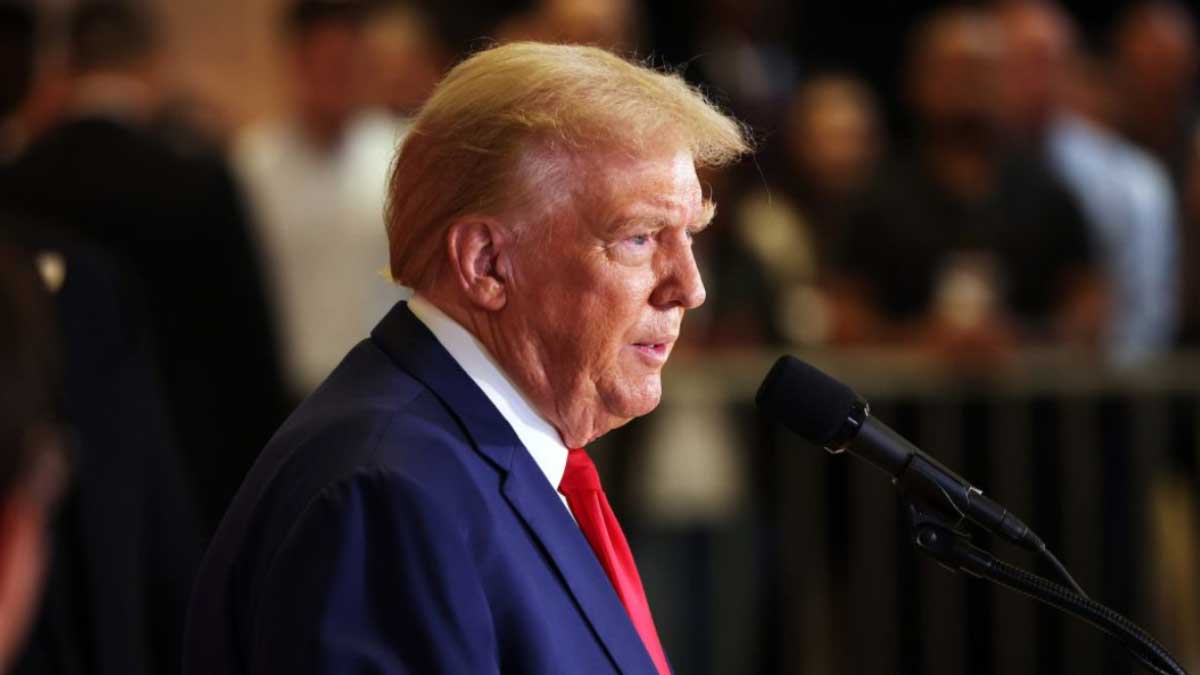- Home
- Billionaires
- Investing Newsletters
- 193CC 1000
- Article Layout 2
- Article Layout 3
- Article Layout 4
- Article Layout 5
- Article Layout 6
- Article Layout 7
- Article Layout 8
- Article Layout 9
- Article Layout 10
- Article Layout 11
- Article Layout 12
- Article Layout 13
- Article Layout 14
- Article Sidebar
- Post Format
- pages
- Archive Layouts
- Post Gallery
- Post Video Background
- Post Review
- Sponsored Post
- Leadership
- Business
- Money
- Small Business
- Innovation
- Shop
Recent Posts
Trump Criticizes Legal Team After Carroll Appeal

Former President Donald Trump expressed profound dissatisfaction with his legal team on Friday, shortly after attending a crucial court hearing concerning the appeal of E. Jean Carroll’s defamation lawsuit against him. This remark highlights the continuing turbulence in Trump’s extensive legal battles, which span both criminal and civil arenas.
During a briefing at Trump Tower, Trump candidly shared his frustration, stating, “I’m disappointed in my legal team, I’ll be honest with you.” He softened his critique by acknowledging their skills and dedication, remarking, “they’re good people, talented people.” This criticism came in the wake of a federal appeals court session where Trump’s appeal of a $5 million verdict was under review. The verdict, delivered earlier, found Trump liable for sexually abusing Carroll in the 1990s and for defaming her after she made her allegations public in 2019.
Trump’s dissatisfaction with his attorneys is compounded by his broader grievances about the legal proceedings. He lamented feeling “sad” about the necessity to defend himself against these claims. Trump suggested that despite the presence of skilled legal professionals on his team, their efforts were undermined by what he termed as “rigged judges” and the political leanings of New York City, which he argued were skewed against him. This sentiment reflects Trump’s broader frustration with what he perceives as systemic biases in his legal challenges.
A focal point of Trump’s criticism was his attorney, D. John Sauer, who represented him during Friday’s appeal. Trump was particularly critical of Sauer for failing to address a key piece of evidence: a dress that Carroll claimed contained Trump’s DNA from the alleged assault. This dress had been a contentious issue leading up to the initial trial, with Carroll seeking Trump’s DNA to verify her claims. Although Trump eventually offered his DNA in exchange for a complete analysis of the dress, the judge deemed the request too late, resulting in the exclusion of this evidence from the trial. Trump’s frustration with Sauer reflects his broader dissatisfaction with how his legal team has managed key aspects of his defense.
Additionally, Trump directed his criticism towards a former member of his legal team, likely referring to Joe Tacopina, who represented him in the initial trial but is no longer associated with his legal defense. Trump expressed regret over Tacopina’s advice to avoid attending the trial, a decision that, in hindsight, contributed to the unfavorable outcome. This criticism underscores Trump’s belief that strategic missteps by his legal team have adversely affected his case.
In his public comments, Trump largely focused on disparaging Carroll and her accusations. He accused Carroll of fabricating her claims, suggesting that her allegations were inspired by an episode of “Law & Order: SVU.” Trump’s remarks extended to Jessica Leeds, who also accused him of assaulting her on a plane. Leeds’ testimony, which was part of the evidence in the Carroll trial, is now being contested in Trump’s appeal. Trump dismissed Leeds’ allegations, labeling her as “not the chosen one” and denying the claims she made.
Looking ahead, the timeline for when the appeals court will issue a ruling on Trump’s appeal remains uncertain. Attorney Mitchell Epner has speculated that a decision may not come until late this year or early 2025. In addition to the appeal at hand, Trump faces a separate defamation verdict in another case involving Carroll. In this case, a jury ordered Trump to pay $83.3 million for defamation and sexual assault, adding another layer of financial and legal pressure. Carroll’s lawyer, Roberta Kaplan, has indicated that additional legal actions might be pursued, suggesting that “all options are on the table.”
A significant aspect of Trump’s legal troubles is the financial burden they entail. Between January 1, 2023, and the end of July, Trump’s Save America PAC has disbursed $67.9 million in legal fees. This political action committee has been a primary source of funding for Trump’s extensive legal battles, raising questions about whether Trump has additional private funds or is personally contributing to his legal expenses.
Amidst his criticism of his legal team, Trump experienced a legal victory in a separate case. New York Judge Juan Merchan decided to postpone Trump’s sentencing in a criminal case involving hush money payments made prior to the 2016 election. The sentencing has been rescheduled to November 26, after the upcoming election, aligning with Trump’s request. Judge Merchan’s decision aimed to avoid any perceived political bias in the sentencing process, emphasizing the need to respect the jury’s verdict and the importance of maintaining judicial impartiality.
The legal saga involving Trump began with allegations from Carroll in 2019, accusing him of raping her in a Bergdorf Goodman dressing room during the 1990s. Trump’s denial of the allegations, asserting that Carroll was not “his type,” led to a defamation lawsuit. The appeal case, one of two brought by Carroll against Trump, was filed under New York’s Adult Survivors Act, allowing adult victims a one-year window to pursue claims despite the expiration of the statute of limitations. The jury in the initial trial found Trump liable for defamation and sexual assault but not for rape. Trump’s legal issues are part of a broader array of challenges he has faced since leaving office, including four criminal cases and a civil fraud case resulting in a $450 million judgment against him. Only one criminal case has gone to trial, while others remain pending. In July, a Trump-appointed judge dismissed charges related to the alleged withholding of White House documents, a decision now under appeal. Despite these legal setbacks, Trump has praised Judge Aileen Cannon, calling her “a brilliant woman.”
Overall, Trump’s ongoing legal battles reflect a complex and multifaceted legal landscape, marked by strategic disagreements, financial pressures, and persistent public scrutiny.
Recent Posts
Categories
- 193cc Digital Assets2
- 5G1
- Aerospace & Defense46
- AI37
- Arts3
- Banking & Insurance11
- Big Data3
- Billionaires449
- Boats & Planes1
- Business328
- Careers13
- Cars & Bikes76
- CEO Network1
- CFO Network17
- CHRO Network1
- CIO Network1
- Cloud10
- CMO Network18
- Commercial Real Estate7
- Consultant1
- Consumer Tech180
- CxO1
- Cybersecurity68
- Dining1
- Diversity, Equity & Inclusion4
- Education7
- Energy8
- Enterprise Tech29
- Events11
- Fintech1
- Food & Drink2
- Franchises1
- Freelance1
- Future Of Work2
- Games141
- GIG1
- Healthcare78
- Hollywood & Entertainment186
- Houses1
- Innovation42
- Investing2
- Investing Newsletters4
- Leadership65
- Lifestyle11
- Manufacturing1
- Markets20
- Media193
- Mobile phone1
- Money13
- Personal Finance2
- Policy567
- Real Estate1
- Research6
- Retail1
- Retirement1
- Small Business1
- SportsMoney33
- Style & Beauty1
- Success Income1
- Taxes2
- Travel10
- Uncategorized8
- Vices1
- Watches & Jewelry2
- world's billionaires418
Related Articles
Trump Moves $4B Stake in Truth Social Parent, Stock Drops 6%
Donald Trump recently transferred his 57% stake in Trump Media & Technology...
By 193cc Agency CouncilDecember 20, 2024House Rejects Trump-Backed Funding Bill, Shutdown Looms
The U.S. House of Representatives rejected a new government funding bill on...
By 193cc Agency CouncilDecember 20, 2024Trump Named Time’s Person of the Year for Second Time
On Thursday, Time magazine honored Donald Trump as its “Person of the...
By 193cc Agency CouncilDecember 12, 2024Meta Donates $1 Million to Trump’s Inaugural Fund
Meta, the parent company of Facebook and Instagram, has confirmed a $1...
By 193cc Agency CouncilDecember 12, 2024















Leave a comment